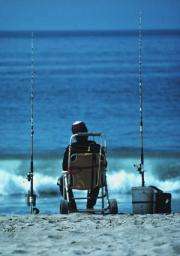Snail mail beats phones as feds try to sustain ample fish stocks in U.S. coastal waters

(PhysOrg.com) -- Old-fashioned snail mail and a postage stamp might be the answer for federal officials struggling to keep the waters off the U.S. coast from being overfished.
Anglers who fish for fun in U.S. coastal waters say the federal government currently relies on bad data to determine which ocean locales are overfished and subsequently placed off limits to recreational and commercial fishing so stocks can rebuild.
The government through the National Marine Fisheries Service has relied heavily on a home telephone survey since the 1970s to random-digit dial coastal households for information about fishing trips.
Now a pilot study in North Carolina has found a new way to calculate recreational fishing activity in the ocean — and it's proven promising as a method to replace calling people on the phone, according to statistician Lynne Stokes, one of five researchers who conducted the North Carolina pilot study.
The study is part of a national overhaul of the way the Fisheries Service collects and reports on recreational fishing data known as the Marine Recreational Information Program, or MRIP.
In fact, the study found that the new questionnaire mailed to selected households via the U.S. Postal Service netted a higher response rate and more complete data, said Stokes, a professor in the Department of Statistical Science at Southern Methodist University in Dallas.
Snail mail is the new telephone
The mail survey asked recreational anglers for the same information as the phone survey — how often they had recently gone fishing off the coast.
"It's kind of like back to the future," said Stokes. "This study showed that the mail survey data collection for this particular survey is quite promising. The data was better and we got a higher response."
Stokes was a member of a National Research Council panel that was asked by the government to critique its existing "Coastal Household Telephone Survey."
The Coastal Household Telephone Survey is carried out regularly by the National Marine Fisheries Service to routinely assess fish stocks in U.S. coastal waters. The Fisheries Service is part of the National Oceanic and Atmospheric Administration, the lead federal agency mandated with protecting and conserving marine life and habitat off the nation's coasts.
Survey critical to fisheries management
Scientists at the NOAA Fisheries Service rely heavily on survey data to determine which areas off the coast are overfished for specific types of fish. The service manages overfishing in various ways, including by imposing annual limits on the amount and type of fish that can be caught and by declaring moratoriums on fishing.
A new law requires the NOAA Fisheries Service to step up protection and conservation. But anglers say it's unfair to use unreliable data to set limits and moratoriums on fishing — which causes hardship for the nation's massive recreational fishing industry.
There are 13 million recreational saltwater anglers in the nation, according to the Congressional Sportsmen's Foundation. Recreational fishing has an $82 billion annual impact on the nation's economy and supports 533,000 jobs, according to the American Sportfishing Association.
The nation's coastal waters are divided into eight Regional Fishery Management Councils created in 1976 to manage the fishery resources within the federal 200-mile limit off the coast. The councils are: New England, Mid-Atlantic, South Atlantic, Gulf of Mexico, Caribbean, Pacific, North Pacific and Western Pacific. The closing this year of the red snapper fishery in the South Atlantic council area has sparked intense controversy.
NOAA has said that U.S. fisheries contribute more than $35 billion annually to the economy, with an estimated $20 billion spent on recreational fishing alone each year.
Mail survey shows promise
Results of the study were presented as "A Pilot Test of a Dual Frame Mail Survey of Recreational Marine Anglers" in August at the 2010 annual meeting of the American Statistical Association in Vancouver.
Other researchers included Nancy Mathiowetz, University of Wisconsin-Milwaukee; J. Michael Brick, Westat; William R. Andrews, NOAA Marine Recreational Information Program; and Seth Muzzy, ICF/Macro.
The researchers chose North Carolina because the state has had a saltwater recreational fishing registry for some time. The purpose of the research is to improve both survey coverage and response rates.
"Phone responses are declining at an alarming rate," Stokes said, partly due to the jump in households that only have cell phones. "People are just less cooperative with phone surveys."
The survey was mailed to 1,800 anglers and included a $1 cash incentive, with a reminder postcard one week later. The rate of response was higher to the mailed surveys than to phone surveys, Stokes said, which is consistent with a general U.S. phone survey trend since the 1980s.
The experiment also showed that a large fraction of North Carolina anglers do not live in coastal county households, which are the only ones directly covered by the current phone survey. Efforts to improve coverage by adding interviews with anglers from registry lists are easier by mail than phone since duplicates are easier to identify.
Solution for shortcoming
A shortcoming of the mailed survey is the inability to get real-time information, which allows the NOAA Fisheries Service to respond quickly to overfishing. Stokes said that problem may be able to be resolved by providing a revised forecast, similar to routinely released economic data for unemployment, job claims, manufacturing and consumer confidence.
Evidence was found that the mail survey suffers from what Stokes described as "avidity bias": People who fish a lot and who are licensed to fish are more likely to respond. The researchers will address that in a revised survey by asking people for information about other recreational activities as well.
Eventually the NOAA Fisheries Service survey will tap anglers on the National Saltwater Angler Registry. A new federal law requires anyone planning to recreational fish in the ocean be signed up with the registry, which the NOAA Fisheries Service launched in January.
Provided by Southern Methodist University

















